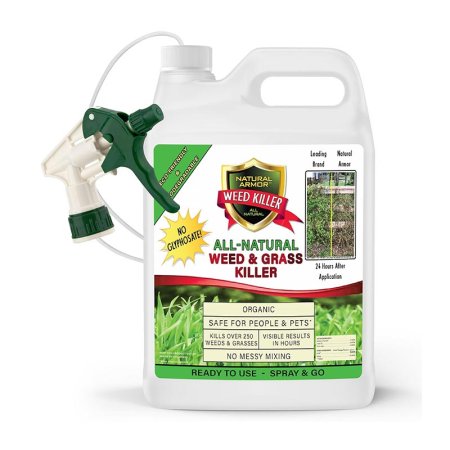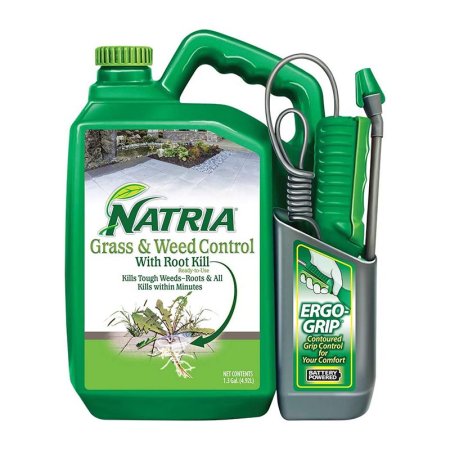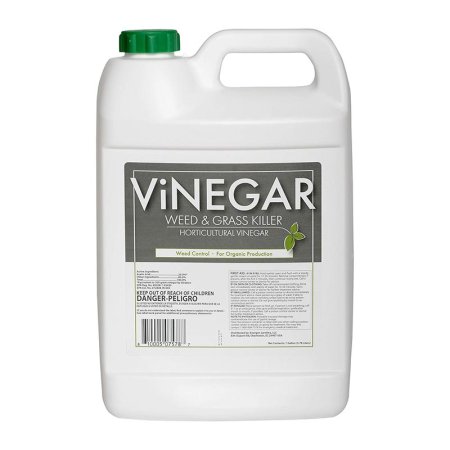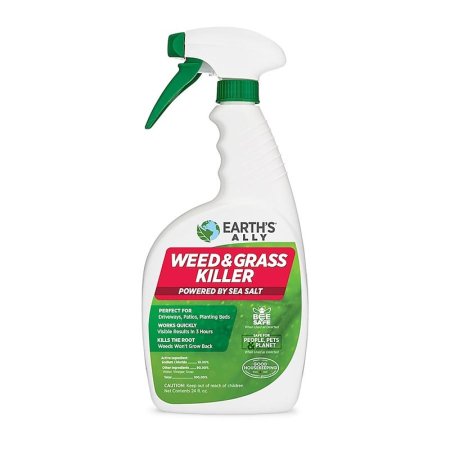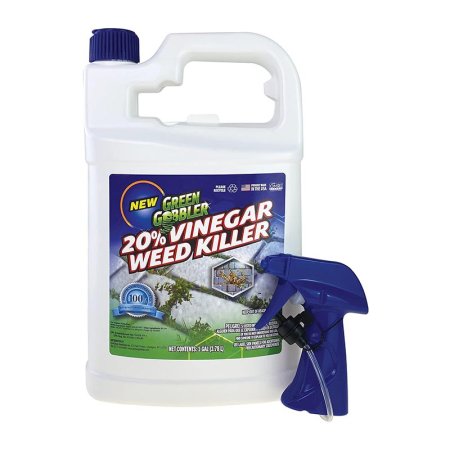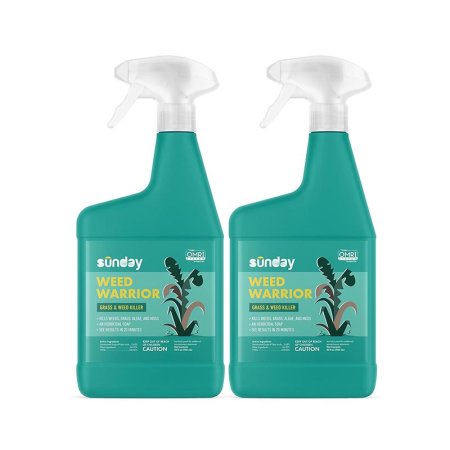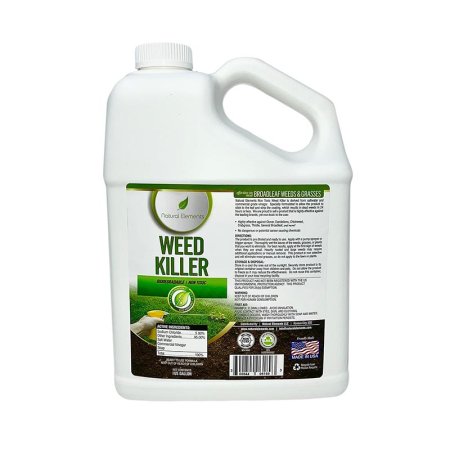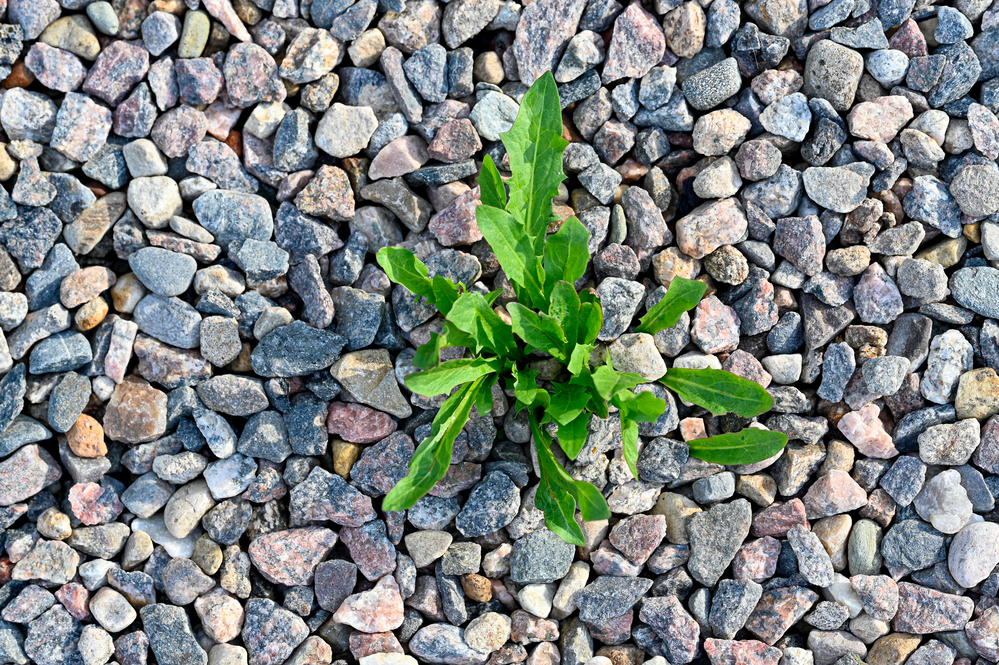
We may earn revenue from the products available on this page and participate in affiliate programs. Learn More ›
Using a weed killer for gravel is often the most effective way to keep driveways and pathways clear of unwanted growth. At first, pulling the occasional dandelion may not seem like a big deal, but when weeds begin to spread in gravel or across the lawn, it can be difficult to keep up—especially if manual removal means digging between rocks. Even with a weed barrier in place, dust and dirt can settle in the gravel over time, creating the perfect environment for weeds to take root.
With hundreds of popular weed killers available in stores and online, finding one that’s both safe and effective can be a challenge. To help you narrow down your options, we researched effective ingredients and tested several highly rated products. Based on our findings, we selected the Natural Armor All-Natural Weed & Grass Killer as the best overall option for its powerful performance and non-toxic formula. Ahead, see which other products we recommend and learn what to look for when shopping for the best weed killers for gravel.
- BEST OVERALL: Natural Armor All-Natural Weed & Grass Killer
↓ Jump to Review - RUNNER-UP: Natria Grass & Weed Control With Root Kill
↓ Jump to Review - BEST BANG FOR THE BUCK: Energen Carolina Vinegar Weed & Grass Killer
↓ Jump to Review - BEST FOR GRAVEL DRIVEWAYS: Earth’s Ally Ready-To-Use Weed & Grass Killer
↓ Jump to Review - BEST POST-EMERGENT: Green Gobbler 20% Vinegar Weed & Grass Killer
↓ Jump to Review - BEST ORGANIC: Sunday Weed Warrior Herbicide Spot Treatment
↓ Jump to Review - BEST PET-SAFE: Natural Elements Non-Toxic Weed Killer
↓ Jump to Review
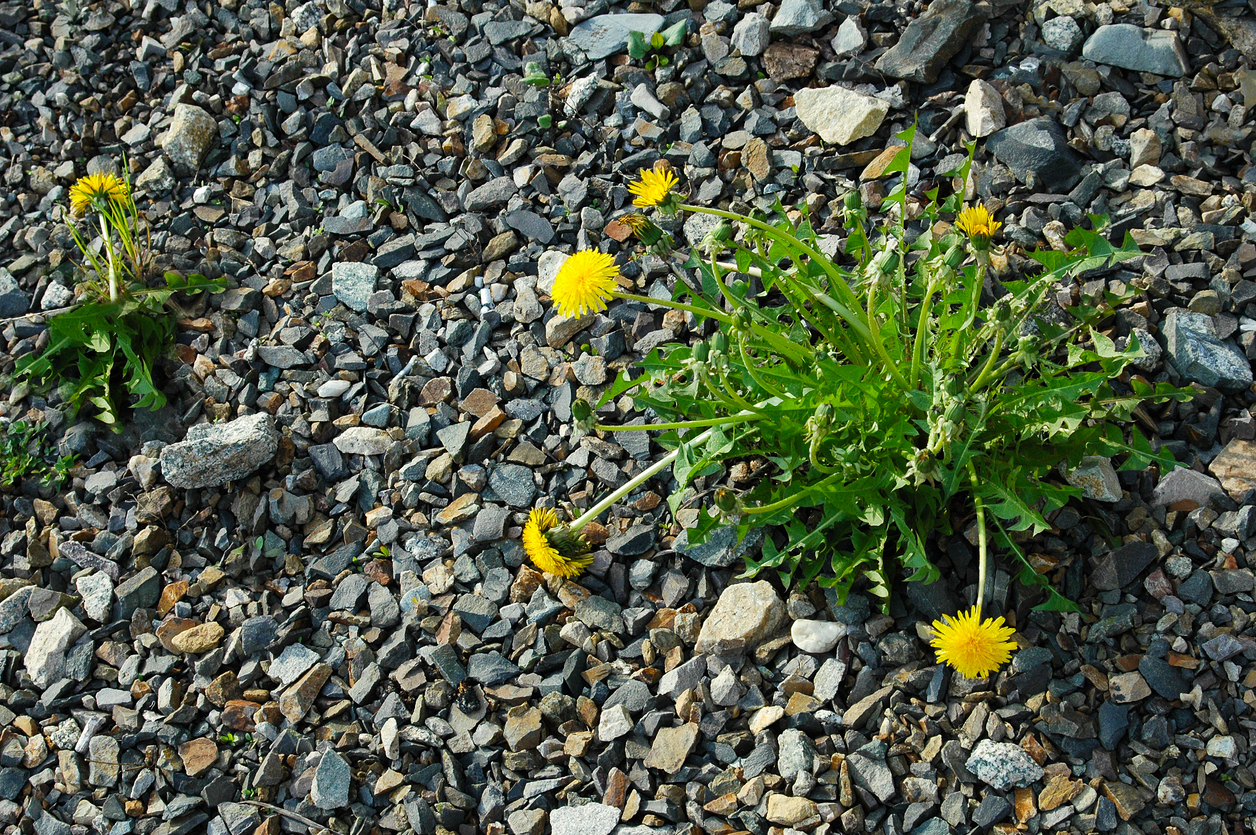
Before You Buy Weed Killer for Gravel
The best weed killers for gravel do more than simply kill existing weeds—they also prevent new ones from sprouting, reducing the need for constant reapplication.
That said, many weed killers that prevent new growth include chemicals that linger in the ground for a year or more. While effective, these chemicals can harm the environment, especially if they seep into lakes, ponds, or streams. They may also leach into adjacent lawns or landscaping, killing grass and beloved plants.
But not all weed killers use harsh chemicals. Organic weed killers use natural ingredients that biodegrade quickly, so they aren’t harmful to people, plants, and animals and are less likely to damage surrounding plant life. While these weed killers don’t prevent new weeds from germinating, they’re generally easy to use and effective at killing weeds in gravel as they appear.
Weed Killers for Gravel Comparison Chart
| Product | Form | Active Ingredient(s) | Working Time |
|---|---|---|---|
| Natural Armor All-Natural Weed & Grass Killer | Ready-to-use | Sodium chloride, citric acid, clove oil, and sodium lauryl sulfate | Within 24 hours |
| Natria Grass & Weed Control With Root Kill | Ready-to-use | Ammoniated soap of fatty acids and maleic hydrazine | Within 24 hours |
| Energen Carolina Vinegar Weed & Grass Killer | Ready-to-use | Acetic acid | Within 24 hours |
| Earth’s Ally Ready-To-Use Weed & Grass Killer | Ready-to-use | Sodium chloride | Within 3 hours |
| Green Gobbler 20% Vinegar Weed & Grass Killer | Ready-to-use | Acetic acid | Within 24 hours |
| Sunday Weed Warrior Herbicide Spot Treatment | Ready-to-use | Ammoniated soap of fatty acids | Within 24 hours |
| Natural Elements Non-Toxic Weed Killer | Ready-to-use | Sodium chloride | Within 24 hours |
Our Top Picks
For us to recommend these products for gravel driveway weed control, they had to meet high standards for performance and ease of use. Each option contains proven ingredients known to kill common weeds and, for pre-emergents, components that prevent weeds from sprouting. These selections offer natural alternatives to harsh chemical formulas and stand out in their categories.
Best Overall
Natural Armor All-Natural Weed & Grass Killer
What We Like
- Weed killer concentrate that’s ready to use
- Safe around people and pets
- Fast-killing weed killer
What We Don’t Like
- Requires reapplication as new weeds appear
Specs
- Form: Ready-to-use
- Active ingredient(s): Sodium chloride, citric acid, clove oil, and sodium lauryl sulfate
- Working time: Within 24 hours
Natural Armor’s non-toxic weed killer earned its place as our favorite weed killer for gravel because it uses concentrated ingredients to get rid of weeds yet doesn’t require mixing or dilution. The fast-acting formula can kill over 250 types of weeds and grasses within hours without relying on harmful chemicals like glyphosate, making it safe for use around people and pets. In addition to salt, citric acid, and clove oil, it also contains soap (sodium lauryl sulfate), which helps it spread more effectively and increases absorption.
Natural Armor is available in several sizes, including ready-to-use sprays for easy application and economically priced refill jugs. You should start seeing results in just a couple of hours, but weeds may take up to 24 hours to die. Like other nonselective weed killers, Natural Armor overspray can damage desirable plants, so use care during application.
What our tester says: “We recommend Natural Armor to any gardener looking for reliable, natural weed control. Its plant-safe formulation means you don’t have to worry about harming pollinators or wildlife. It is nonselective, though, so be careful using it around plants you want to keep.”—Debbie Wolfe, Product Reviews tester and writer
Get the Natural Armor weed killer for gravel (various sizes) at Amazon, Lowe’s, or Walmart.
Runner-up
Natria Grass & Weed Control With Root Kill
What We Like
- No adverse environmental effects
- Kills all the way to the roots
- Won’t stain gravel, concrete, asphalt, or brick
- Rainfast within 3 hours
What We Don’t Like
- Overspray could kill desirable plantings
Specs
- Form: Ready-to-use
- Active ingredient(s): Ammoniated soap of fatty acids and maleic hydrazine
- Working time: Within 24 hours
Those seeking eco-friendly options for removing weeds from gravel driveways and paths will want to consider this grass and weed control product. The ready-to-use weed killer spray comes in a 1-gallon jug with an attached trigger sprayer to make treating weeds a snap. The active weed-killing ingredients, ammoniated soap of fatty acids and maleic hydrazine, penetrate deep into plants’ cellular structure, reaching the roots for a thorough kill. Best of all, the fatty acids break down within 5 days, leaving no lingering environmental impacts.
To use, spray each weed thoroughly, saturating all foliage surfaces. Be careful to avoid getting Natria on nearby plants or grass, as it will kill those in addition to unwanted weeds like chickweed, crabgrass, poison ivy, red clover, and many more. After application, you should start seeing results in minutes, though full weed control for lawns and gravel may take up to 24 hours and will require repeat application as new weeds pop up.
Get the Natria weed killer for gravel (various sizes) at Amazon, Ace Hardware, or Tractor Supply Co.
Best Bang for the Buck
Energen Carolina Vinegar Weed & Grass Killer
What We Like
- Large coverage area increases value
- 20 percent vinegar; environmentally friendly
- No mixing required
What We Don’t Like
- Overspray could kill desirable plantings
Specs
- Form: Ready-to-use
- Active ingredient(s): Acetic acid
- Working time: Within 24 hours
Many organic herbicides come at a premium price, often costing several times more than chemical-based alternatives. Energen is an exception, earning its place on our list as a budget-friendly, heavy-duty weed killer that delivers excellent eco-friendly results without a high price tag. Those looking for a weed treatment for lawn or garden areas, gravel driveways, or even flower beds will find it not only effective but safe, as its primary ingredient is industrial-grade vinegar (acetic acid).
Though this 20-percent vinegar product does a great job killing weeds up to 2 days before harvest and can even be used in organic gardening, it’s a good idea to wear eye protection and clothing that covers exposed skin during use. Acetic acid can cause burns if directly contacted, but kids and pets are safe to enter the area once the product dries.
Get the Energen Carolina weed killer for gravel (various sizes) at Amazon, Walmart, or Target.
Best for Gravel Driveways
Earth’s Ally Ready-To-Use Weed & Grass Killer
What We Like
- Penetrates roots to prevent regrowth
- Visible results within 3 hours
- Comes in 2 ready-to-use sizes and a concentrate
What We Don’t Like
- Must fully saturate weeds for best results
Specs
- Form: Ready-to-use
- Active ingredient(s): Sodium chloride
- Working time: Within 3 hours
Not only is this herbicide environmentally friendly, but it’s also one of the safest options for pets and people. Though its active ingredient is simply salt water, it functions as a professional weed killer, delivering excellent results in high-traffic areas like gravel driveways and footpaths.
When sprayed on weeds in gravel, it works by drying them out, which turns them brown within hours. For best results, apply it on a dry, sunny day and thoroughly saturate weeds with four to five sprays. Since Earth’s Ally requires no mixing and comes with a sprayer, it’s easy to store in the garage and have on hand for quick treatments whenever new weeds appear. For those needing to treat larger areas, it may be more economical to buy the concentrate and mix up bottles as they go.
Get the Earth’s Ally weed killer for gravel (various sizes) at Lowe’s, The Home Depot, Amazon, or Walmart.
Best Post-Emergent
Green Gobbler 20% Vinegar Weed & Grass Killer
What We Like
- OMRI (Organic Materials Review Institute)-listed for organic use
- Doesn’t require mixing
- Acetic acid is 4 times stronger than household vinegar
What We Don’t Like
- High-concentration vinegar can burn skin and eyes
Specs
- Form: Ready-to-use
- Active ingredient(s): Acetic acid
- Working time: Within 24 hours
While a pre-emergent weed killer is one of the best ways to keep your gravel driveway free of unwanted growth, not applying it early enough in spring means dealing with weeds after they’ve sprouted. For those all too familiar with this situation, Green Gobbler is an excellent solution. With a 20 percent acetic acid concentration, it’s four times stronger than regular vinegar, making it powerful for weed spraying in gravel. Plus, it’s glyphosate-free, so it’s much safer for the environment than chemical options.
Though Green Gobbler kills fast, turning weeds completely brown within 24 hours, and degrades quickly to prevent lingering environmental effects, the highly concentrated formula can burn exposed skin. Wear gloves, eye protection, and clothing that covers your skin during use.
What our tester says: “We’ve used several vinegar-based weed killers and found that Green Gobbler works great for eradicating young weeds. It does have a strong vinegar odor, but as long as we spray it downwind, it will definitely be part of our environmentally safe herbicide collection.”—Debbie Wolfe, Product Reviews tester and writer
Get the Green Gobbler weed killer for gravel (various sizes) at Amazon, The Home Depot, Walmart, or Green Gobbler.
Best Organic
Sunday Weed Warrior Herbicide Spot Treatment
What We Like
- Starts working in minutes; full results within a day
- Noncorrosive soap-based formula dehydrates plants
- Won’t stain gravel, brick, or concrete
- OMRI-listed for organic use
What We Don’t Like
- Nonselective formula kills indiscriminately
Specs
- Form: Ready-to-use
- Active ingredient(s): Ammoniated soap of fatty acids
- Working time: Within 24 hours
Sunday’s Weed Warrior spot treatment is a fast-acting, nonselective weed killer that starts causing visible die-off in mere minutes. The formula uses ammoniated soap of fatty acids as its active ingredient, causing dehydration of unwanted weeds and grass that leads to quick death. In addition to being effective against algae, bluegrass, stinkweed, thistle, lambsquarters, lichen, crabgrass, dandelions, and more, it’s also OMRI-listed for safe organic gardening.
This ready-to-use weed and grass killer is sold in spray bottles and gallon-size refills, making it an economical way to keep up on weeds in gravel as they appear. Just be sure to apply it when they first pop up, as Weed Warrior works best on small, early-growth weeds under 5 inches in size. It also has a limited amount of preventative protection, about 21 days in our tests. Large, difficult weeds might need a second application.
What our tester says: “In our experience, Sunday works faster than vinegar-based products. We saw great results using it on crabgrass, clover, plantain, and wild violet in several lawn areas as well as on crack weeds on the driveway and sidewalk”—Mark Wolfe, Product Reviews tester and writer
Get the Sunday weed killer for gravel (various sizes) at Amazon, The Home Depot, Walmart, Target, or Sunday.
Best Pet-Safe
Natural Elements Non-Toxic Weed Killer
What We Like
- Pet- and people-safe formula
- Biodegradable and glyphosate-free
- No mixing required
What We Don’t Like
- Kills whatever it’s sprayed on
Specs
- Form: Ready-to-use
- Active ingredient(s): Sodium chloride
- Working time: Within 24 hours
With sodium chloride as its active ingredient, the Natural Elements weed killer is a people- and pet-friendly option for ridding gravel pads of unwanted plants. Though it relies primarily on salt, this nontoxic formula also includes a bit of commercial-grade vinegar and soap, which provide an extra boost that results in near-immediate wilting.
One interesting thing we noticed about this pick is that, when we first started using it in early spring (while temps were around 55 degrees Fahrenheit), weeds took longer to die than they did once it got up to 80 degrees Fahrenheit or more outside. Still, it worked incredibly well even at low temperatures, and treating new weeds with the sprayer that comes on the 32-ounce size couldn’t have been easier. Like the rest of the biodegradable and glyphosate-free nonselective weed killers on our list, Natural Elements will kill any plant it’s applied to, so remember to use care during application.
What our tester says: “We expected the Natural Elements weed killer to work well, but we were surprised by how quickly it took effect. Weeds turned yellow in just a few hours and brown within 24.”—Stacey L. Nash
Get the Natural Elements weed killer for gravel (various sizes) at Amazon or Natural Elements.
Or, DIY Your Own Weed Killer
Before commercial weed killers, people relied on homemade formulas, many of which are still worth trying today. These non-toxic and eco-friendly options often include ingredients like borax, salt, vinegar, and dish soap.
- Borax: Sodium borate, or borax, is a naturally occurring mineral with an alkalinity of about 9.5. This is high enough to make it lethal to most weeds, whose pH is often between 6 and 7. Spraying weeds with a simple solution made of borax and water will usually get rid of them.
- Salt: Common table salt disrupts a plant’s water balance, causing it to wither. While effective, salt lingers in soil and prevents new growth, making it a poor weed killer for flower beds and other areas where beneficial plants grow, but good for driveways and walkways.
- Vinegar: Though weaker than the industrial version (acetic acid) household vinegar kills weeds when used at full strength or diluted 1:1 with water and sprayed on foliage.
- Dish soap: By itself, liquid dish soap may not effectively kill weeds, but adding a few drops to other homemade formulas helps them stick better to the foliage for absorption into the plant.
Jump to Our Top Picks
Our Verdict
While many are used to popular herbicides like Roundup Weed Preventer, RM43 Total Vegetation Control Weed Preventer, Ortho GroundClear Year Long Vegetation Killer, and Preen Extended Control Weed Preventer, we don’t recommend these products since they contain chemicals that don’t meet our sustainability guidelines (glyphosate, imazapyr, and trifluralin).
Instead, we recommend chemical-free formulas for killing unwanted growth, such as our top pick, the Natural Armor weed killer for gravel, and this budget-friendly product, the Energen Carolina weed killer for gravel. Both use natural ingredients like salt, soap, and vinegar to kill weeds without harming people, pets, or the planet.
How We Chose the Best Weed Killers for Gravel
Gravel is a common material for creating rustic walks and driveways, but it’s not impermeable, so weeds can blow in and sprout or spread inward from the sides of the graveled area. It’s common to put a weed barrier, such as a plastic liner, between the soil and the gravel, but weeds can still get a foothold over time.
We researched dozens of weed-killer products to determine which were well suited for use in gravel beds or sanded areas. While we considered chemical weed killers that have reputations for efficiency, we ultimately went with only eco-friendly products that meet our sustainability guidelines. Though their performance might be a bit different than that of harsh chemical alternatives, we are willing to potentially spray more often using a natural weed killer to avoid ingredients that can remain in the ground for up to a year. The products that made the final cut in our lineup as the best weed killers for gravel are effective and user-friendly.
What to Consider When Choosing the Best Weed Killer for Gravel
The same weed-killing products used to treat other areas, such as along sidewalk cracks, under fence lines, and in lawns, can all be used on gravel and sand. But it’s especially important to use post-emergent weed killers early on when it comes to gravel—since even a few weeds can mar a tidy look.
The weed problems common to gravel vary widely, ranging from a single dandelion that springs up in the center of a path to invasive creeping grasses that systematically eat away at the sides of a driveway. No matter what type of weed woes shoppers are dealing with, the herbicide chosen needs to be strong enough to kill the unwanted vegetation. In some cases, it might also be a good idea to use a product that keeps future weed seeds from sprouting.
Selectivity
When it comes to weed killers, the ingredients in the product will be either selective or nonselective.
- Selective weed killer: Many herbicides are selective, meaning they kill certain specific types of weeds but not others. The type of weeds killed by selective herbicides depends on the product. Several selective herbicides may be combined to increase the number and type of weeds killed.
- Nonselective weed killer: This herbicide will kill all plants—both unwanted and wanted. When applying nonselective weed killers to gravel driveways and paths, take care to ensure overspray does not come into contact with desirable plants or the lawn.
Ingredients
The most effective weed killers feature one or more chemical herbicides known for their ability to vanquish vegetation. Some active ingredients work to wipe out weeds, while others act as mixing agents or surfactants to help the herbicide stick better for increased absorption. The following ingredients are commonly found in weed-killing products.
- Glyphosate: A nonselective herbicide most commonly sold under the brand name “Roundup.” It is powerful, effective, and arguably the best total vegetation killer available today.
- Triclopyr: An ingredient found in some weed-killing products, triclopyr is a nonselective herbicide. It will kill various weeds, including invasive woody plants such as mesquite and locust, but it won’t harm most types of turfgrass, making it among the best options for use on gravel paths adjacent to lawns.
- Fluazifop: This is a selective herbicide designed to kill broadleaf weeds that can grow in gravel or sand, such as varieties of sedges. It’s often combined with triclopyr to produce an herbicide product that kills a broader range of weeds. However, it will kill turf grass, so it’s not suitable near lawns.
- 2,4-D: Another selective herbicide that will kill invasive types of broadleaf weeds, 2,4-D may also be combined with triclopyr for greater weed-killing power. Like triclopyr, it’s safe to use near lawns.
- Imazapyr: This is a nonselective herbicide that kills a broad range of weeds, including many types of invasive grasses that can creep into gravel drives and paths.
- Vinegar: Many natural weed killers contain highly concentrated vinegar, a nonselective product that will kill all plants it contacts. Effectiveness depends on the strength of the vinegar.
- Sodium chloride: Better known as table salt, sodium chloride kills weeds by dehydrating them and starving them of the nutrients they need to survive. Sodium chloride does remain in the soil, making it unsuitable for plant growth, so it shouldn’t be used in garden beds or other areas where beneficial plants grow.
- Ammoniated soap of fatty acids: A natural ingredient, ammoniated soap of fatty acids kills weeds as the acids accumulate in a plant’s cellular structure, causing the plant to dehydrate and die. Especially stubborn weeds may require two or more applications.
Persistence
The persistence or lingering effect of an herbicide is determined by how long it continues to kill weeds after application and whether it breaks down when it comes into contact with water. Product labels might not use the term “persistence,” but they often detail how long products continue to work.
A weed killer that remains on a path or a driveway for a few months is desirable for gravel and sand. Short-term weed killers will eliminate existing weeds but don’t offer a residual killing effect, so frequent treatments may be necessary.
Pre-Emergent vs. Post-Emergent
By definition, weed-killing products are “post-emergent” because they kill weeds that are currently growing. Post-emergent weed killers take out weeds that have already emerged from their seeds.
On the other hand, pre-emergent products do not kill weeds but keep weed seeds from sprouting. For long-lasting weed-free gravel walks and driveways, users may want to apply a weed-killing product containing added pre-emergent ingredients, such as benefin, isoxaben, trifluralin, or siduron, among several others.
For the best results, read product labels to determine which type of weed seeds are controlled by a pre-emergent ingredient because most will keep only certain weed seeds from sprouting. Manufacturers may combine one or more pre-emergent chemicals for broader protection.
Contact vs. Systemic
Nonselective herbicides are further classified as either contact or systemic.
- Contact: This type of herbicide kills the green foliage it contacts. For the best results, spray contact herbicides uniformly on weeds, coating as much of the green parts as possible. The effect of the green parts dying typically shocks the weed to such an extent that it kills the entire plant.
- Systemic: A systemic herbicide penetrates the weed’s foliage and travels throughout the entire plant—all the way to the roots—to kill it. Systemic herbicides are among the most potent types and should be used with caution. Overuse may cause the chemical to travel from weed roots to the roots of nearby desirable plants, killing them as well.
Coverage
Weed killer for gravel comes in various strengths and application coverage rates. In general, concentrated liquid products offer the most significant coverage, and some still come in ready-to-use forms that don’t require dilution or mixing.
Most manufacturers list their product’s coverage as “up to” a specific square footage. For example, a ready-to-use weed killer may come in a spray bottle designed to treat up to 500 square feet, while a concentrated product may cover up to 4,000 square feet (or more) of a gravel drive when diluted as directed on the package.
Safety
Commercial weed killers can be toxic to humans, animals, and the environment if not used as intended. Herbicide products bear the warning: “It is a violation of federal law to use this product in a manner inconsistent with its labeling.” Hence, it makes good sense to take safety precautions.
- Follow the instructions: Only use the product as directed on the label. Do not mix a stronger solution than recommended, and do not apply it while children and pets are in the vicinity.
- Protect eyes and skin: Wear long sleeves, long pants, and gloves to protect your skin. It’s also good to wear a pair of protective goggles—or at least don a pair of sunglasses—to protect your eyes before applying weed killer to gravel.
- Avoid application when windy: No matter what type of weed killer you’re applying, the safest way to keep it where it needs to be is to use it when the wind isn’t blowing.
- Stay off the gravel: It typically takes time before the chemical on a treated area dries and no longer poses a danger to pets and humans. This could be as little as 2 hours or as long as 48 hours, so ensure that folks and pets stay off the gravel during this time.
FAQs
Unwanted weeds can spread quickly, turning a good-looking gravel path into a shoddy mess. If you’re not quite ready to buy a weed torch and still have a few questions about gravel weed killers, the answers below could help.
Yes, weed killers work on weeds no matter where they sprout. The best weed killer for driveways will work on gravel, sand, or even where weeds sprout from cracks on concrete driveways.
The Natural Armor weed killer for gravel uses salt to kill a wide array of weeds and a surfactant that helps it stick for better absorption, which makes it one of the best all-around organic weed killers for gravel driveways.
Follow the manufacturer’s directions. Spray or sprinkle the product on the weeds at the recommended rate. Granular weed killer may require watering afterward, while some sprays should not be applied when rain is in the forecast.
The only permanent way to get rid of grass that grows in a gravel driveway is to pave over it with concrete—repairing your driveway to add a weed barrier or get rid of creeping roots likely won’t solve the problem. Since that’s not an option for many, the next best thing is to use a weed killer to remove existing weeds and a pre-emergent to keep new seeds from sprouting. It’s not permanent, but diligence can keep the driveway looking neat.
It could temporarily damage the soil, depending on the product used. Some products leave residual traces behind that keep future weeds (and all plants) from growing for a few months to a year.
Generally speaking, weed killer sprays are better than granular products since they’re already in a liquid state the weed can absorb rather than requiring additional moisture.
It’s best to spray weed killer when plants are dry, and rain is not in the immediate forecast. This ensures the weed killer is applied at maximum strength and gives it time to work without the risk of being washed away.
The best time of day to apply weed killer is usually in the afternoon or evening when temperatures are higher and the weeds are dry. It’s also smart to spray weed killers when it’s calm to prevent overspray from landing on plants you’d like to keep.



